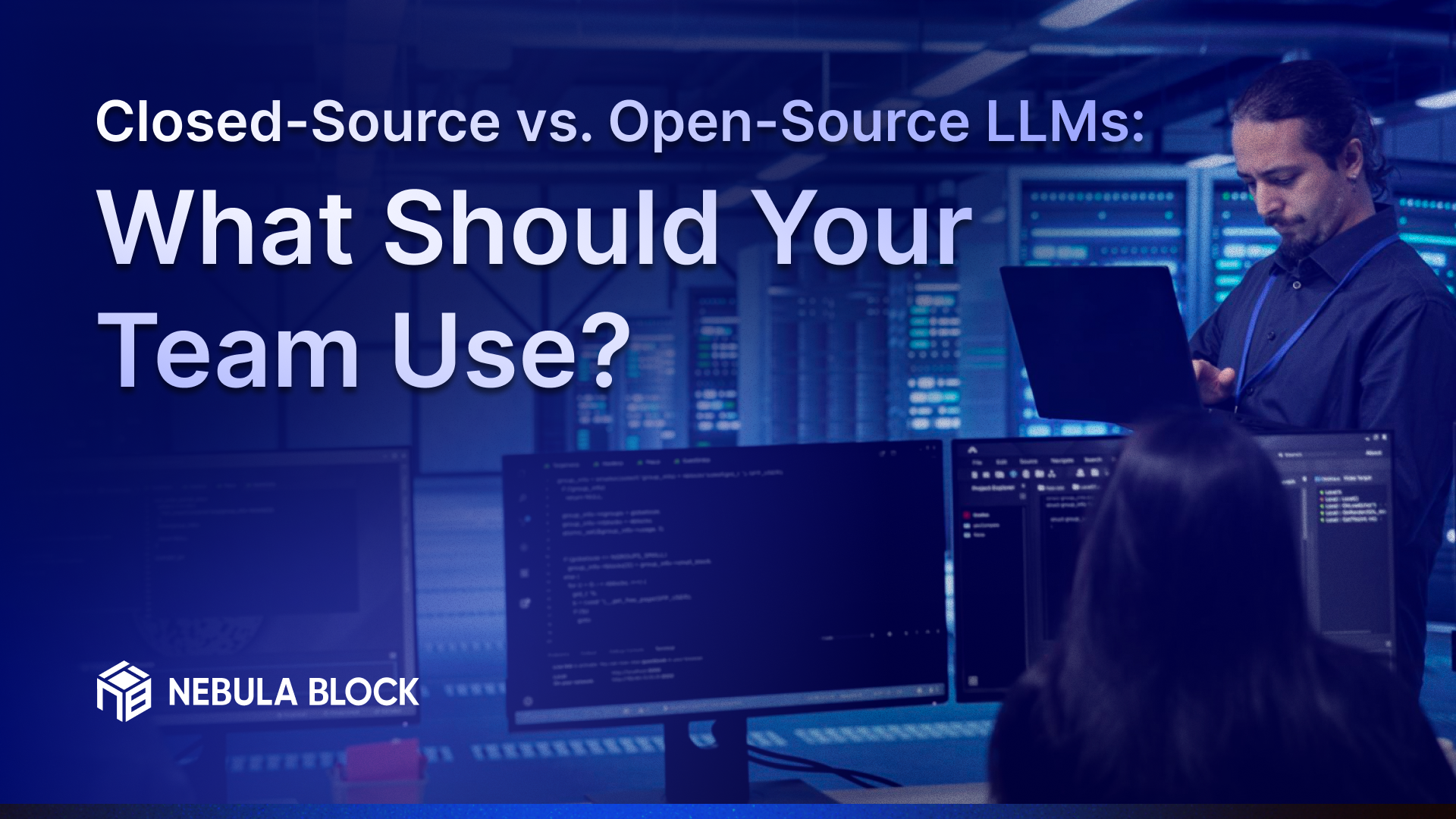Closed-Source vs. Open-Source LLMs: What Should Your Team Use?

In recent years, large language models (LLMs) have transformed the landscape of AI applications, enabling capabilities such as text generation, summarization, and complex data analysis. When choosing a model for your team, you typically face a critical decision: Should you opt for a closed-source or an open-source solution?
Let's explore the advantages and disadvantages of both approaches, along with how Nebula Block can support your decision-making process.
Understanding Closed-Source LLMs
Closed-source LLMs are proprietary models developed by organizations that retain exclusive control over their designs and underlying data. Popular examples include models from OpenAI and Google.
Advantages:
- Ease of Use: Closed-source models often come with user-friendly APIs, comprehensive documentation, and straightforward integration processes.
- High Performance: Proprietary models are optimized for performance, yielding higher quality outputs.
- Support and Maintenance: Users can benefit from dedicated support services and regular updates from the developing organization.
- Great for non-technical teams who just want an easy, reliable model.
Disadvantages:
- Cost: Often involve subscription fees, which can add up quickly.
- Limited Customization: Minimal ability to modify or tailor the model.
- Data Privacy Concerns: Risk of sensitive data exposure when using third-party APIs.
Notable closed-source models on Nebula Block: OpenAI GPT-4, Anthropic Claude-Sonnet-4, Google Gemini and more.
The Case for Open-Source LLMs
Open-source LLMs are developed collaboratively and can be freely accessed, modified, and distributed. Examples include models like GPT-Neo and DeepSeek.
Advantages:
- Cost-Effectiveness: Typically have no licensing fees.
- Flexibility and Customization: Teams can modify models according to their requirements.
- No vendor lock-in: self-host or migrate anytime.
- Data Control: Enhanced data privacy through local deployment.
Disadvantages:
- Need for Technical Expertise: Requires a dedicated team for deployment and maintenance.
- Community-Driven Support: May rely on slower community support for updates and troubleshooting.
- Performance Variability: Quality can vary, necessitating thorough evaluation.
Open-sourced available on Nebula Block: DeepSeek series, Qwen2.5-VL-7B-Instruct, BGE-large-en-v1.5 and more.
Comparison Table
| Feature | Closed-Source LLMs | Open-Source LLMs | Nebula Block Advantage |
|---|---|---|---|
| Cost | Typically high (subscription fees) | Free or minimal cost | Free-tier available, pay-as-you-go GPU or API |
| Ease of Deployment | High, user-friendly API | Higher complexity, requires expertise | Both available: no-code API + full GPU root access |
| Customization | Limited | Highly customizable | Fine-tune, quantize, or run any model on your own terms |
| Performance | Generally optimized | Variable, requires evaluation | Choose high-end GPUs (B200, H100) for max performance |
| Support | Dedicated developer teams | Community-driven support | Discord + docs + infra or directly via dev team |
| Data Control | Less control (data sent to API) | Full control (local deployment) | Serverless or self-host — your choice |
| Model Variety | Vendor-limited | Huge open model zoo | Access Claude, GPT-4, DeepSeek, LLaMA3.3-70B, Seedream-3.0 etc. |
| Scalability | Rate-limited | Manual scaling | Scale instantly with multi-GPU pods or auto serverless |
Why Choose Nebula Block?
Nebula Block provides high-performance GPU instances, supporting both closed-source and open-source model deployments. Our platform offers:
- Unified Platform: Easily scale your compute resources to match the specific demands of your chosen model, whether it's closed-source or open-source.
- No Deployment Needed for Serverless inference.
- Reserved Instances: Cut costs with weekly/monthly reservation options
- Cost-Effective Solutions: Enjoy competitive pricing that enables you to experiment with different models without breaking the bank.
- Technical Support: Access to our team of experts to help you navigate your deployment choices and optimize performance.
- Data Privacy: With the ability to run models on your infrastructure, ensure compliance with data privacy regulations specific to your industry.
LLM Development Lifecycle: From Idea to Production
No matter which model type you choose, the LLM development lifecycle generally follows:
1. Select → 2. Test → 3. Fine-tune → 4. Scale → 5. Secure
Nebula Block supports each stage with GPU access, object storage, APIs, and fine-tuning tools — all integrated in one platform.
Licensing Considerations
Some popular open-source language models are available under licenses that may limit how you can use them, especially in commercial settings. Here's a quick reference:
- LLaMA 3.3 (non-commercial use) – permitted for research, evaluation, personal projects
- DeepSeek (R1 / R1‑0528 / V3‑0324) – Open and commercially friendly
- Qwen2.5‑VL‑7B‑Instruct – permissive open-source license
- Mistral: MIT license (free for all uses)
- BGE‑large‑en‑v1.5 – Apache 2.0 license, easy for production use
✅ Always check license terms if you plan to deploy a model in production.
Conclusion: Choosing What’s Best for Your Team
Ultimately, the choice between closed-source and open-source LLMs depends on your team's specific requirements, technical capabilities, and budget. If your team is looking for rapid deployment and ease of use, a closed-source solution may be the better fit. Conversely, if your team has the technical expertise and values customization and cost, open-source LLMs provide the flexibility you might need.
| Use Case | Recommended LLM Type |
|---|---|
| MVPs, Chatbots, Internal Tools | Closed-Source |
| Custom agents, RAG, cost scaling | Open-Source |
| Regulated or on-prem environments | Open-Source (self-host) |
| No infra team, fast delivery | Closed-Source via API |
Make this decision wisely, and your team can fully leverage the potential of LLMs in your projects! Nebula Block is here to empower your journey in AI.
Next Steps
Sign up and explore now.
🔍 Learn more: Visit our blog and documents for more insights or schedule a demo to optimize your search solutions.
📬 Get in touch: Join our Discord community for help or Contact Us.
Stay Connected
💻 Website: nebulablock.com
📖 Docs: docs.nebulablock.com
🐦 Twitter: @nebulablockdata
🐙 GitHub: Nebula-Block-Data
🎮 Discord: Join our Discord
✍️ Blog: Read our Blog
📚 Medium: Follow on Medium
🔗 LinkedIn: Connect on LinkedIn
▶️ YouTube: Subscribe on YouTube